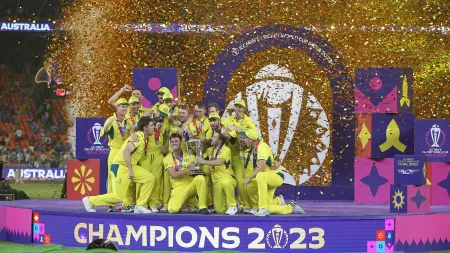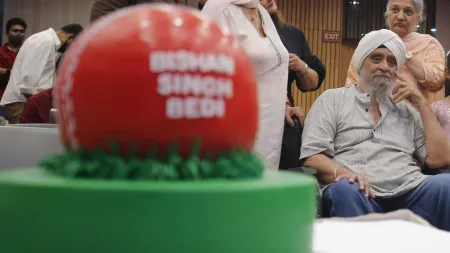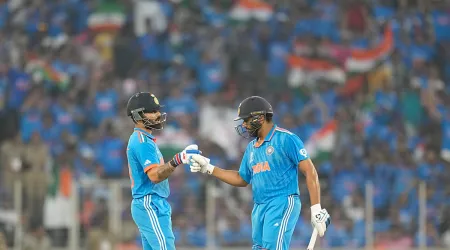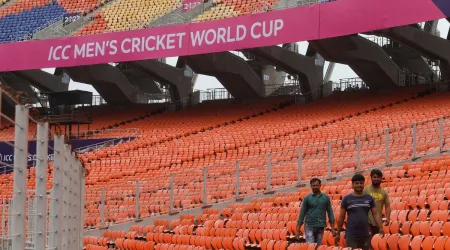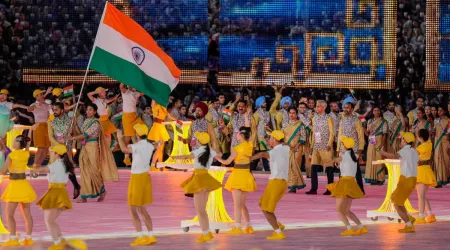- India
- International
FIFA U-17 World Cup: Football trends in Iran, Iraq despite social media curbs
According to Iraq coach Qahtan Chither, his players are allowed one phone call each “sometimes” to check on their families.
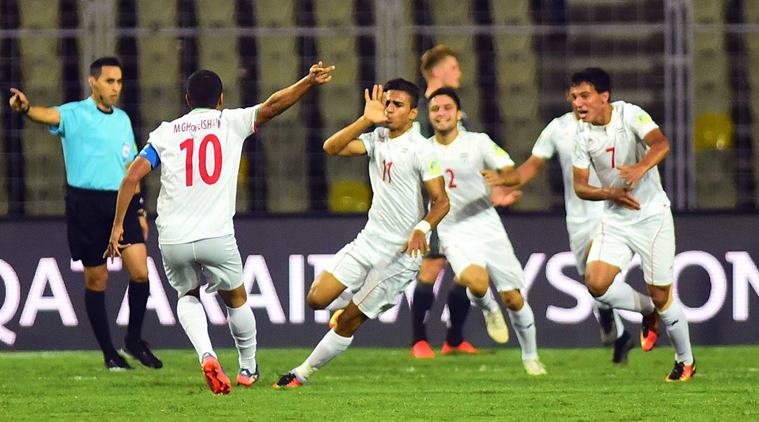 Players of Iran Younes Delfi celebrate the secound goal against Germany. (Source: Express Photo)
Players of Iran Younes Delfi celebrate the secound goal against Germany. (Source: Express Photo)
IRAN COACH Abbas Chamanyan, not one to smile too often anyway, scoffs at the mention of “internet” and asserts that his players are allowed no access to it. He then tells you that he doesn’t let them carry phones either.
The Iraqi players are in India without their phones too. According to Iraq coach Qahtan Chither, they are allowed one phone call each “sometimes” to check on their families. This at a time when the never-ending civil war has taken a new, more violent, turn following the Kurdistan Referendum — Iraqi forces captured the city of Kirkuk back from the Kurds on Monday.
The internet ban on the players from the two neighbouring nations is ironic though. The internet has largely, after all, been the only solace for millions of fanatical football fans in both countries over the last few years. With freedom of expression not really a taken-for-granted right in both countries, social media has also been the only window for them to comment, discuss and debate about a sport that not only gets them excited but also often provides a sense of sanity amidst the incessant chaos.
With FIFA having banned all international football for four years from 2013 in their country, Iraqis — who have more than a dozen officially recognised fan groups for European teams — had to be content with posting about the exploits of their beloved European clubs and the national team online despite the constant internet blackouts that they have to deal with. So commonplace are they that, two years ago, the Iraqi government ordered a nationwide blackout during exam season — the official reason given was that it was to stop students from cheating.
FIFA lifted the ban, if only for friendlies, earlier this year with Jordan facing the Lions of Mesopotamia (Iraqi national team) in June. One fan even managed to use Twitter to invite any fan visiting the city to stay with him. And even though thousands saw Iraq win 1-0 in Basra, the unrelenting security threats end up being a major cause for keeping them away. Travelling overseas to write on the national team too has become a seemingly grim process, which means even journalists have to take to social media to keep a tab on their team. A senior Iraqi football writer working with a leading Arabic media organisation couldn’t make it to India after failing to procure a necessary visa to cover the event.

Iranians, meanwhile, do not have legal access to Twitter and Facebook. Instagram is the only major social media channel which remains legal. Yet, according to GlobalStats—an online visitor stat tool—33.46 per cent of Iranians are active on Facebook while 10.65 per cent manage to get through to Twitter. They do so by using VPN (virtual private network) accesses and have flooded Twitter with hundreds and thousands of Team Melli (moniker for the Iranian national team) handles and hashtags.
Social media has experienced a fascinating ride in Iran. The former regime of Mahmoud Ahmadinejad is learnt to have tried various ways of clamping down on its use. Internet use is heavily filtered and monitored in Iran. There were even reports that people were hired for seven US dollars an hour to be virtual vigilantes and identify dissenters on the internet. The internet policing was organised directly by the Revolutionary Guard themselves with many voices of dissent even facing arrest.
Twitter was considered the big evil after anti-regime protestors began using it to rile up sentiments against Ahmadinejad as part of a political movement that became known as the Green Movement. Iranians began using the platform to propagate other social changes too, like women being allowed to drive there after a similar resolution was passed in Saudi Arabia. But as elections drew near, even former President Ahmedinejad was creating his own Twitter profile and addressing the nation.
His successor Hassan Rouhani’s election campaign was backed by a strong promise to lift sanctions on social media. He presently is reported to have more Instagram followers than Carlos Queiroz, the extremely renowned Portuguese coach of the Iranian national team.
Paid social media
The slightly freer access to internet in Iraq though has created different issues, according to football writer Hassanin Mubarak. He, for one, is not surprised that the Cubs of Mesopotamia, as the Iraqi under-17 team is called, are not being allowed to use their phones while the World Cup is on.
“This generation of Iraqi players are the first to feel the outbursts and criticism from social media, some players in the national team claim that their form has suffered because of comments on Facebook. And there are many other stories about coaches and players trying to influence public opinion on social media like paying individuals to write positive stories about them and negative or false stories on coaches who they want to get sacked or take their positions in their team,” he says.
Facebook sees the biggest following for Iraqi football on social media, according to Mubarak. But while there are two official pages for the team on the site, which were started around 2010; dozens of others have sprouted up mainly dealing with news regarding the team. But over time, in addition to providing a voice to the voiceless, social media has also become a sounding board for those with nefarious political agendas.
“Some of these Facebook pages have become like political lobbies within football in Iraq. The former Iraqi coach Radhi Shanaishel claimed his sacking was made possible by Facebook — with stories written against him, thousands of negative comments and FA trying to temper public opinion by finally sacking him. The Iraq Football Association have shut down their Facebook page on numerous occasions because of hundreds of negative comments,” he adds.
Mubarak also provides some historical context to why the cubs’ dramatic entry into the second round of the competition is generating immense interest back home. He reveals how youth competitions were a way of demonstrating youth progression under the political ideals of the state by the Baathist government as way back as 1975.
“I’m not sure whether many football fans in England are even aware that their under-17 team is in India. They’re busy following their clubs in the Premier League. In Iraq, the sports papers and online media and social media are full of reports and news on the Iraqi under-17 team in India as if it was the senior team,” he says.


















